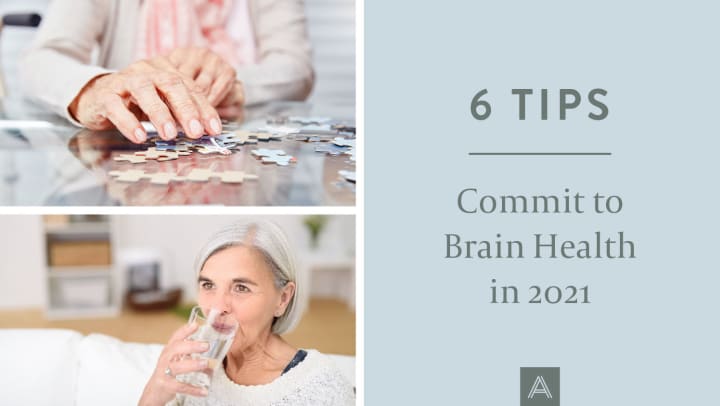50 million people worldwide live with dementia, a condition marked by an impaired ability to remember, think, or make decisions that interferes with everyday activities1. Age is the strongest known risk factor for dementia. Anthology Senior Living communities offer residents exclusive access to an evidence-based cognitive stimulation program called Fit Minds.
Anthology Senior Living and Fit Minds offer these six tips to help anyone commit to brain H.E.A.L.T.H. in the New Year.
Brain health begins with commitment, and New Year’s Resolutions are borne out of commitment,” says Janet Knupp, founder and Chief Executive Officer of Fit Minds, “We encourage you to make a New Year’s commitment to your brain health alongside Anthology Senior Living and Fit Minds.”
H- Healthy Diet
According to Knupp, one of the top reasons seniors are admitted to hospitals is for dehydration. “When you have dementia you often forget to drink,” says Knupp. As we age, the amount of fluid in our bodies begins to decrease, resulting in fewer available water resources available in our bodies. Knupp advises making drinking water part of the daily routine, particularly for seniors. Not only is drinking water an important part of supporting brain health, Knupp adds, when a person has a diagnosis of dementia, structure and routine are essential.
Healthy eating may help protect your body and your brain. Harvard researchers recommend limiting sugar and saturated fats while increasing your intake of healthy fruits, vegetables, and whole grains. Fatty fish, berries, plant oils, nuts and coffee (limited to two cups a day) contain omega-3 fatty acids or antioxidants that boost brain health. The DASH diet (Dietary Approaches to Stop Hypertension) and the Mediterranean diet reduces inflammation, potentially lowering the risk of Alzheimer’s.
E-Exercise Your Body
Exercising for as little as 30 minutes a day can benefit brain health. Specifically, regular physical exercise may help lower the risk of Alzheimer's and vascular dementia, a type of dementia caused by diseased blood vessels that reduce blood supply to the brain. Exercise increases the heart rate, which increases blood and oxygen flow to the brain. A medically-approved exercise program such as the group classes offered at Anthology Senior Living communities are designed to safely improve cardiovascular fitness while also benefiting brain health.
A- Attitude of Mutual Respect
Creating an environment of mutual respect is important for the brain health of the caregiver as well as the senior, according to Knupp. Take time for your own self-care as a caregiver. “Self-care matters because our seniors need us to be in our best state,” Knupp said. It is important to treat a person with dementia with kindness and dignity. “They’re not children. Knock before you enter their room and ask, ‘May I please come in?’” At the end of each session, Fit Minds professionals are trained to empower participants. Knupp advises finding small ways to grant individuals with dementia decision making power and ability to exert control, such as deciding which activity to participate in on a Monday morning. According to Knupp, “People with dementia know who is treating them with respect.”
L- Learn Every Day
Exposure to new ideas is one of the cornerstones of the Fit Minds program. This includes engaging with novel and complex content beyond crossword puzzles, trivia and bingo. “While people like trivia and crossword puzzles, they pull from your long-term memory,” says Knupp. “It’s even more important to help develop and strengthen connections.” “Learn new material versus looking backward,” Knupp adds.
Christine Baker implements the Fit Minds program in her role as Director of Elements at Anthology of Clayton View. “I’m a huge believer in learning as you age and continuing to engage in educational activities,” Baker said. Baker pairs the FIT Minds program with an “editorial club” in which residents read an article – sometimes a controversial article – over the weekend and engage in discussion the following Monday. “I like to use a white board with markers to make it interactive. We also use the iN2L, a giant, immersive touch screen, or we stream visual content from an iPad to our movie theatre,” Baker said. Baker earned her undergraduate degree in art therapy and enjoys infusing art and creativity into cognitive stimulation programming.
Learning a new language or the history behind a piece of classical music are other ideas for introducing novel content.
T- Train Your Brain
Even if you don’t have access to a program such as Fit Minds, Knupp recommends finding diverse ways to exercise the brain based on the five dimensions of the program: language and music; visual and spatial orientation; memory; critical thinking; and computation. Some activities will resonate more than others, so it’s important to employ variety. Jigsaw puzzles and maps are popular tools to explore; these activities activate visual and spatial orientation located in the hippocampus and surrounding medial temporal lobes. At Anthology Senior Living communities, team members vary activities to suit the needs and interests of residents. A typical session of FIT Minds focuses on building cognitive resilience through question-answer sessions, worksheets, and manipulatives that have been adapted for safe engagement during COVID-19.
H- Higher Purpose
A sense of purpose in life – believing what you do matters – may also help to protect the brain against the damage of Alzheimer’s according to a study from Rush University Medical Center in Chicago, where researchers studied more than 1,500 seniors since 1997. “A sense of purpose matters a lot, both for the caregiver and the person with diagnosis,” says Knupp. She points to the benefits of exploring personal purpose, passion and spirituality.
“We’ve stayed on our toes during COVID to encourage cognitive therapy,” according to Mallory Disbrow who serves as Director of Elements at Anthology of Louisville. Disbrow, who earned her undergraduate degree in sociology and philosophy, says Fit Minds allows her to utilize her academic background for the benefit of residents. “Having that scholarly background really pays off because I never know who will move into our community.” Disbrow says she enjoys tailoring cognitive therapy programming to inspire and engage individual residents.
Christine Baker of Anthology of Anthology of Clayton View adds, “Our cognitive stimulation program gives residents a sense of purpose, in helping themselves.” Baker and Disbrow say residents’ families enjoy hearing of their loved one’s success in the program. “The Fit Minds program and so many programs Anthology offers help our residents keep their brains sharp,” Baker said.
Described as “a personal trainer for the mind,” the Fit Minds program is designed to activate the brain in five key areas. Residents at Anthology Senior Living assisted living and memory care communities nationwide experience twice-weekly Fit Minds activities designed to maintain their cognitive resilience, defined as the ability of the brain to recover from disease trauma.
At Anthology Senior Living, Fit Minds provides an opportunity to connect with community and engage the brain, a clear benefit during a time of social isolation due to COVID-19.
To learn more about Fit Minds, visit FitMinds.net
Commit to your brain health and schedule a tour to learn more about cognitive stimulation therapy at your local Anthology Senior Living community.


